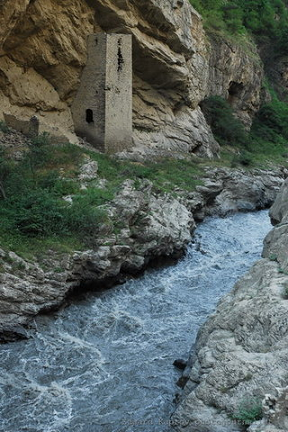And the mountains will remain By German Sadulayev, special to Prague Watchdog
St. Petersburg
Commentators have noted the lack of symmetry in the new legal measures that have accompanied the introduction of the ending of the counter-terrorist operation in Chechnya. From a legal perspective, the operation itself rested on a theoretical and practical basis that was thoroughly shaky, and whose sole purpose was to avoid the direct application of international humanitarian law to those who took part in hostilities on both sides.
Under international humanitarian law as enshrined in the Geneva Conventions, armed groups operating under a single command and fighting units of a regular army on their own territory with the aim of defending the sovereignty of the state and the preservation of the governmental status quo could not be categorized as “terrorists”.
Whichever way one looks at it, this was a war.
But for Russia to acknowledge this would have meant that it had to act within the law. That would have entailed fixing boundaries between combatants and civilians, with the appropriate treatment of each category, and the humane treatment of prisoners of war.
In Chechnya there was none of that. The official justification was the restrictions imposed by the counter-terrorist operation. In practice this meant that those who did not go into hiding could be treated with impunity. Everything was permitted.
A war ends with negotiations or capitulation, with the mandatory adoption of relevant legislation and the definition of a new status for the territory involved. A war ends with the release of prisoners by both sides. A war ends with the burial and reburial of the dead.
But in the streets of the Chechen Republic it’s a holiday again: there are flags, music, dancing. It’s hard to say how far these events are spontaneous or government-inspired. Perhaps they are both. In the loud music and rhythms of the lezginka [a popular folk dance] and the emotional speeches of the Chechen deputies, the significance of this event is being lost.
What is really happening is that with the ending of the counter-terrorism operation in Chechnya another counter-terrorist operation is spreading to the whole of Russia. And when one takes account of the recent murders and assassinations abroad, it is spreading to all citizens and former citizens of Russia, wherever they are. The “fight against terrorism” has become truly extraterritorial.
Yet the ending of the operation in Chechnya is a victory. It means the ending of the exceptional and extraordinary powers of the federal law enforcement agencies in the Chechen Republic. The removal, perhaps, of the last vestiges of the Chechen President’s monopoly on power. The lifting of restrictions, the opening of a customs house in Grozny and the granting of international status to Grozny airport offer new prospects on the economic level.
And on the political one. Now the Chechen President need no longer be ashamed in front of foreign delegations, which at present are compelled to make an unnecessary detour and fly via Moscow, where they must also show their respect for the Russian leadership.
It is Russia’s army which has lost. For the soldiers and law-enforcers who are serving in Chechnya, the end of the counter-terrorist operation means the end of the special “fighting” supplements to their pay. The Russian government is cutting back on public spending. In my humble opinion, that is a good thing. It will stem the flow of those who go to Chechnya “to make a bit of cash”.
Now there is no pretext at all, either far-fetched or official, for extrajudicial killings – the fight against crime must be conducted with the due process of law.
Perhaps I am too idealistic.
One final thing. There must now be a complete cessation of the shelling and bombardment of forest and mountain areas. In Shali, even several years after the end of active hostilities, artillery fire was heard in the mountains. At the time I wrote: “they were firing at the mountains as if the mountains were fighting with them.” The guns only fell silent when the artillery units of the 58th Army were moved from Shali to South Ossetia. There they found a new target, but for our mountains it was only a temporary respite.
Now there is a hope that the mountains and forests will be able to forget the blasts of mines and shells. The war lasted nine and a half years. Twice as long as the Second World War. I close my eyes and see the Caucasus Ridge emerging on the horizon. Nine and a half years - in the lives of mountains that is only an instant. And they go on standing there as before.
If anyone has stood their ground in this war it is the mountains.
Photo: borodatyi.livejournal.com. (Translation by DM) (P,DM)
DISCUSSION FORUM
|

